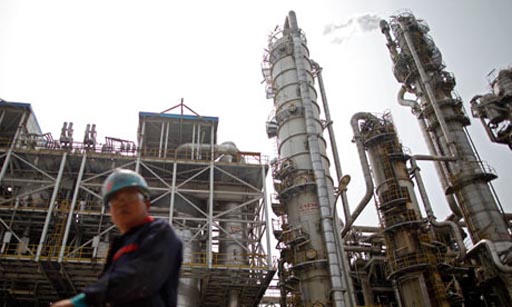06/11/2012
One of the most egregious scams of modern times is
carbon credits from HCF-23, the UN payments for which
have enriched many an Indian and Chinese entrepreneur, who have been producing CFCs for the sole purpose of claiming payments for getting rid of the by-products.
Last year,
almost to the day, after EU action to curtail this $6 billion scam, Chinese officials were threatening to vent these "powerful greenhouse gasses" direct to atmosphere.
Having had $1.3bn in tax revenues out of the scam, they were fearful about the loss of revenue. Historically, plants have been paid 70 times the cost of destroying HFC-23 gases, and the local governments have thus benefited hugely by being able to tax the generous profits.
However, this year the situation has gone the other way. The emissions offset market is oversupplied by 13 billion metric tons of carbon dioxide equivalent, more than 1,000 times greater than the anticipated demand of 11.5 million tons.
As a result, the
price for UN emission credits is set to drop almost to zero. Already, investors are dumping the greenhouse-gas credits, known as Certified Emission Reductions (CERs), after the price, up to last December, had dropped 85 percent, year-on-year.
This means that not only could the Chinese vent their CFCs, the
Indians may join in as well, with a steep rise in emissions expected. Each ton of the waste gas HFC-23 is equivalent to 12,000 tons of carbon dioxide.
In India, specifically, there is no domestic legislation that would force companies cut HFC-23 emissions, and there are no plans to impose such laws nor to include these projects in a national carbon plan.
The three plants producing the gas destroy the equivalent of around 10 million tons a year of CO2, making hundreds of millions of dollars in the process - in some cases over 50 percent of the plant revenues. Now each plant is faced with costs estimated at around $200,000-350,000 a year for destruction of the gasses.
In China, there are eleven HFC-23 projects getting UN funding, and while observers hope the government will act to force chemical companies to destroy their waste gasses, with no income stream from carbon offsets, it is anyone's guess as to what will actually happen.
Last year, Samuel LaBudde, senior atmospheric campaigner with the Environmental Investigation Agency, was saying that, "China is not the victim here, and a world order responsive to climate change cannot be predicated on unrepentant greed".
LaBudde added that: "attempting to force countries into squandering billions on fake offsets that actually increase production of greenhouse gases is extortion". Thus, in the bizarre world of carbon trading, we are faced with the choice of emissions or extortion. If we are really lucky, I suppose, we could have both.
COMMENT THREAD

